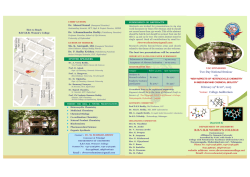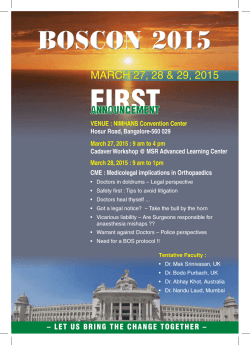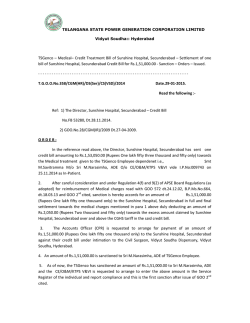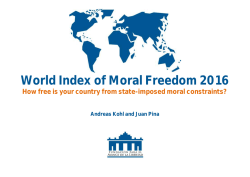
International Seminar on Religion and Literatures from 29th-31st
Osmania University Centre for International Programmes International Seminar on “Religion and Literatures” 29 – 31 JANUARY 2015 Osmania University Centre for International Programmes Osmania University Campus, Hyderabad – 500 007 Telangana, India Ph: +91-40-27098609, 27079914 Fax: +91-40-27070137 Website: www.oucip.in Email: [email protected], [email protected] Call for papers It is a matter of common knowledge that Religion plays a major role in regulating the human behavior on a day to day basis. Primitive societies acknowledged the supremacy of nature and they therefore devised the mystical ways and means of taming the wayward natural forces in favor of the human progress and development. Primitive folks began to worship nature to propitiate the mysterious powers of nature in the form of primitive gods and goddesses. Thus the organized religions came into existence in different forms in various societies of the world. Man as a product of nature shared the same natural waywardness in his behavior, actions, and motivation. As a unique embodiment of these elemental forces, he found himself not only a threat to his society but also to himself. It led the organized religions to not only contain the natural furies and forces by ritual propitiations but also to control the wily human instinct. The purpose was to regulate the human behavior so that it was conducive to his spiritual growth and material prosperity and to stability and peace in his community or society. It would induce an overall progress of people in spiritual, moral, ethical, and biological spheres. The intention of our ancient ancestors to create such ideal conditions was to elicit the best out of the humans and to expedite the great march of nature toward the ultimate goal to shape up an ideal human—a paragon of all human virtues. The original aim of the religion as a harbinger of human growth on the spiritual and material levels slowly began to inherently clash with each other within the human self. This clash between spirituality (soul) and materiality (body) slowly reached its zenith in the second half of the nineteenth century in the world over in general and in the Western world in particular. With the rise of Scientific Rationalism and Industrial Revolution the European society was deluded by a wave of skepticism and atheism. Money took a sudden precedence over the moral intent of man. People began to question the basic tenets of Christianity and the very existence of God: “Who is God? … Where is God? Darwin, Freud, Bergson, Marx and many others added further to people’s disbelief in the supernatural reality. It gave rise to social, theological, and spiritual chaos in Europe which finally terminated into a crass material competitiveness among the powerful nations. The result was the First War and later the Second World War. The two wars in the first half of the twentieth century totally transformed the human psyche and bred a deep element of empiricism in the human mind. Religion, God, Devil, Salvation and Sin became debatable issues. The religious “unbelief” seemed to prevail upon the sense of metaphysical belief. Under such circumstances people looked for the alternate means of spiritual replenishment and moral sustenance for personal peace and social harmony. At this critical juncture in the history of Christianity in particular and world religions in general, the writer occupied the central stage as messiah of the new age. He drew people’s attention as the alternate source of their salvation and spiritual peace. Such role for a writer actually cannot be taken as a misnomer for the simple reason that literature rises from the depths of the writer’s soul and appeals to the reader’s spirit for his moral and ethical upliftment. And, this is precisely what a religion does to the seekers of salvation. Literature portrays a life-like world keeping in view the world he lives in. He imitates this world inhabited by living men and women. But, he does not portray it as it is. He improves upon it, redeems it of its faults and follies, refines and reframes it to suit an all round growth of the humans. The writer demonstrates not what the world is, but what the world “ought to be” for the inclusive growth of the humanity. His primary concern is indeed not so much the material and scientific progress of humanity as the moral and spiritual one. In that respect, his literary creations provide an alternative route to man’s moral, ethical, and spiritual growth whereby one can tame one’s animal instinct for an improved human life. By virtue of the writer’s moral concern in our age of the metaphysical unbelief, literature works as a possible means of spiritual salvation for contemporary humanity. The Osmania University Center for International Programs (OUCIP) proposes to hold a three day International Seminar on “Religion and Literature” with a view to examining the role of literature as an alternative means of moral replenishment and spiritual salvation for contemporary humanity which is currently in the grip of an obdurate wave of religious skepticism and unbelief. The discourse of the seminar would veer around the interface of Religion and Literature at different levels. An attempt would be made to ascertain the ways in which the two dominant aspects of the human society interact with each other. It would help the students, teachers, and writers of literature to approach literature with a new awareness—the awareness of literature as an alternative or substitute or surrogate religion in the contemporary period of metaphysical unbelief. The papers will deal with the following aspects of the subject of the seminar: Literature as Critique of Religion Religion as Source of Literature Literature and Belief Primitive Religions and Modern Literature Literature as an Alternative to Religion Christianity and Literature Hinduism and Literature Judaism and Literature Islam and Literature Buddhism and Literature The Center would later bring out an Anthology of selected papers for the benefit of the students, scholars, and others. Paper Presentation Abstract on about 250 – 300 words should reach on / before 15th December 2014, to [email protected] MS Word 97-2003 format with Times New Roman, 12 Font, along with Title, Authors names, Address, email. Presentation facilities: Multimedia projectors for Power Point presentations (MS office) will be made available. Conference Important Dates 1. Abstracts Confirmation 2. Registration 3. With Late Fee : : : 30th December 2014 05th January 2015 20th January 2015 Registration Fee (Includes Boarding & Lodging and Conference Kit): S. Category Without Late With Late Fee No. Fee 1 2 Osmania University Teachers & Scholars National Delegates including Research Scholars outside Hyderabad Foreign Delegates Spot Registration 1500 2000 2,500/- 4000/- 4500/- 5500/- USD $300 USD$350 USD$400 USD $180 USD $200 USD $300 1,800/- 2,100/- 2500/- 2,000/- 2,500/- 3,000/- Accompanying delegate 3 4 Research Scholars in Hyderabad Accompanying person*** ***Conference material will not be provided to Accompanying person. Mode of Payment: Bank draft in favor of “Director, Osmania University Centre for International Programmes” payable at Hyderabad, AP, India. Visa All overseas participants require a valid passport and entry visa for India. Please consult your travel agency or nearest Indian Embassy/ Consulate Office. Kindly intimate us once your travel plan is ready give us details to inform the Ministry of External affairs, Home ministry, Govt. of India, DST govt. of India, Home ministry, Govt. of Andhra Pradesh and security agencies. Insurance The registration fees do not include insurance for the participants regarding accidents, sickness or loss of personal property. Participants are requested to make their own arrangements with respect to health and travel insurance. Osmania University With a sprawling campus of nearly 1600 acres and buildings of majestic beauty and architectural splendor, Osmania University, is perhaps, the largest higher education system in the Country. It is a home to nearly 300,000 students pursuing their higher studies in its Campus, Constituent, Affiliated Colleges and District Centres. Its faculty and staff number nearly 5000. It is a multi-faculty and multidisciplinary university, offering rich and varied courses in the fields of Humanities, Arts, Sciences, Social Sciences, Law, Engineering, Technology, Commerce and Business Management, Information Technology and Oriental Languages. The University’s strategic planning, teaching-and-learning policies and research direction have always emphasized respect for the concerns of the society and the need to address the issues that challenge it. In recognition of its excellent academic achievements, Osmania University had the distinction of being awarded the 'A' Grade status by the National Accreditation and Assessment Council (NAAC) of the University Grants Commission, Government of India in the year 2008. OUCIP Osmania University Centre for International Programmes came into existence in September 2006 after the Ministry of Human Resource Development, Government of India, handed over the management and administration of the American Studies Research Center (ASRC) to Osmania University. It is housed in the building complex of the ASRC and has inherited its academic and infrastructural strengths. However, OUCIP has broadened its scope and added new fields of study from humanities and social studies to American Studies. This was done with the realization that a single discipline Centre with a single source of funding was neither possible nor feasible in the context of the growing need for multi- and inter-disciplinarity within the academia. It was also felt that Osmania University located in the city of Hyderabad, needed to reflect the multi dimensional growth and reach of the city that has been evolving as a major hub for the new knowledge’s emerging in different fields. OUCIP was thus conceived to complement the special status of the City in which it is located while retaining its strength in the disciplines of American Studies and International Relations acquired over four decades. General Information about Hyderabad Hyderabad is the pearl city of India developed on the banks of Moosi River by the Nizam dynasty. This 400 year old city was named after Hyder Mahal wife of the ruler Quli Qutab Shah. Hyderabad is the capital of Telangana and is a cosmopolitan city on the fast track. The elegant buildings, marbled temples and monuments stand testimony to it. It shows cases a unique convergence of tradition with modernity. The city is dotted with various tourist attractions like Salarjung Museum, Charminar, Chowmahalla palace, Golconda Fort, Nehru Zoological Park, Birla Mandir, Birla Planetarium/Science Museum, Shilparamam, Hussain Sagar Lake, Lumbini Park, Ramoji Film City, Mount opera and Jalavihar etc. The city is sure to provide a myriad of experiences and delight to the visitors with its splendor and magnificent palaces that enchant past glory. Time: GMT+5 hours 30 minutes Electricity: 230 - 240V, 50HZ Weights & Measures: Metric Weather: During the period of conference, the climate of Hyderabad will be cool and pleasant. The day temperatures range from 25 to 30°C and night temperatures from 8 to12°C with clear sky. Light winter clothing is required during month of December. Currency Exchange: Indian rupees is the currency used at Hyderabad and the exchange rate is approximately 57/- Indian Rupees for one US$. All countries major currency can be exchanged at Hyderabad. One can get the currency exchanged at Airport/ Star Hotel. ATMs are Available for all major International and National banks. Credit cards: Credit cards viz., American Express, Diners Club, Master Card and Visa are widely accepted. Communication hub: Prof. A. Karunaker, Convenor, I/c Director, OUCIP Osmania University, Hyderabad 500 007 Telangana State, India Contact Cell Phone No +91- 9849302145 For General query : [email protected] For Abstract submission : [email protected] For Accommodation request : [email protected] Osmania University Centre for International Programmes International Seminar on “Religion and Literatures” 29 – 31 JANUARY 2015 Registration Form 1. Name In Block Letters 2. Designation 3. Country / Nationality 4. Mailing Address with PIN Code and E-mail (Entire correspondence will be through e-mail) 5. Contact Number with country & local code Mobile : Office : Residence : 6. Demand draft No. Amount Date: Bank: 7. I am interested in contributing the paper If Yes send the abstract to [email protected] YES / NO 8. Title of the paper 9. I am interested in reserving accommodation for which advance payment is made If Yes mail to [email protected] YES / NO Date Place Signature of the Participant
© Copyright 2026
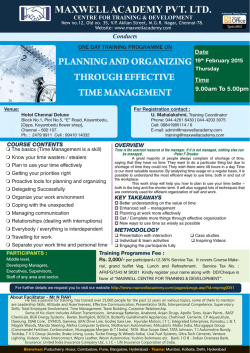
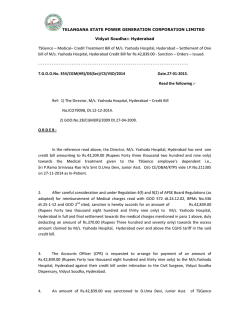
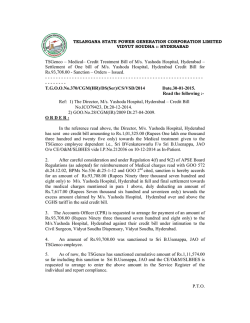
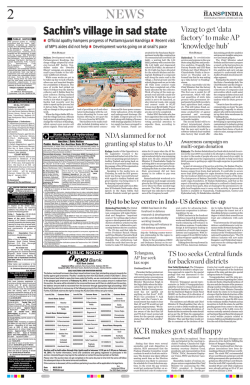
![TIME TABLE MARCH-APRIL 2015 V I III[IMP/BL]](http://s2.esdocs.com/store/data/000483508_1-7e40507e02bf7111da7196362309b7b4-250x500.png)
